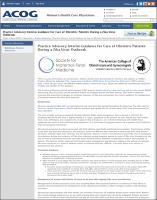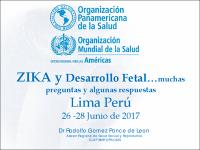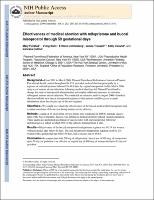Practice advisory: interim guidance for care of obstetric patients during a zika virus outbreak
| dc.contributor.author | American College of Obstetricians and Gynecologists (ACOG) | |
| dc.date.accessioned | 2016-02-03T15:18:42Z | |
| dc.date.available | 2016-02-03T15:18:42Z | |
| dc.date.issued | 2016 | |
| dc.identifier.uri | http://clacaidigital.info/handle/123456789/719 | |
| dc.description.abstract | Zika during pregnancy has been associated with birth defects, specifically significant microcephaly. Transmission of Zika to the fetus has been documented in all trimesters; Zika virus RNA has been detected in fetal tissue from early missed abortions, amniotic fluid, term neonates and the placenta. However, much is not yet known about Zika virus in pregnancy. Uncertainties include the incidence of Zika virus infection among pregnant women in areas of Zika virus transmission, the rate of vertical transmission and the rate with which infected fetuses manifest complications such as microcephaly or demise. The absence of this important information makes management and decision making in the setting of potential Zika virus exposure (i.e. travel to endemic areas) or maternal infection, difficult. Currently, there is no vaccine or treatment for this infection. | es_ES |
| dc.language.iso | en_US | es_ES |
| dc.publisher | ACOG | es_ES |
| dc.subject | zika | es_ES |
| dc.subject | Guía de práctica clínica | es_ES |
| dc.subject | Transmisión Vertical de Enfermedad Infecciosa | es_ES |
| dc.title | Practice advisory: interim guidance for care of obstetric patients during a zika virus outbreak | es_ES |
| dc.type | Technical Report | es_ES |
Files in this item
This item appears in the following Collection(s)
-
Guias de práctica [108]



